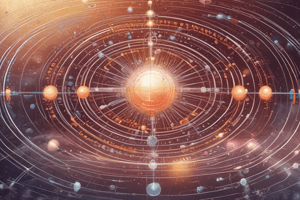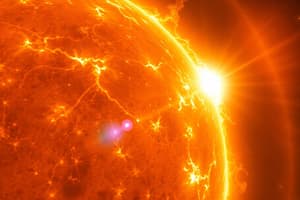Podcast
Questions and Answers
What are neutrinos, and what are their properties?
What are neutrinos, and what are their properties?
Neutrinos are subatomic particles produced in beta decay, with very little mass and no electric charge.
What is the beta particle in beta decay?
What is the beta particle in beta decay?
The beta particle is the emitted electron (-1e 0 ).
What is the equation for beta decay, and what does it represent?
What is the equation for beta decay, and what does it represent?
The equation is 0n 1 → 1p 1 + −1e 0 + 0ν 0, representing the conversion of a neutron into a proton, an electron, and a neutrino.
What are antiparticles, and what are their characteristics?
What are antiparticles, and what are their characteristics?
Signup and view all the answers
What is the positron, and how does it relate to the electron?
What is the positron, and how does it relate to the electron?
Signup and view all the answers
What happens when two high-speed protons collide, and what laws are conserved in this process?
What happens when two high-speed protons collide, and what laws are conserved in this process?
Signup and view all the answers
What is pair production, and what laws are conserved in this process?
What is pair production, and what laws are conserved in this process?
Signup and view all the answers
What is pair annihilation, and what happens to the mass of the particle-antiparticle pair?
What is pair annihilation, and what happens to the mass of the particle-antiparticle pair?
Signup and view all the answers
What is the key difference between leptons and hadrons?
What is the key difference between leptons and hadrons?
Signup and view all the answers
What are the three types of quarks that make up baryons?
What are the three types of quarks that make up baryons?
Signup and view all the answers
What is the difference between a quark and an antiquark?
What is the difference between a quark and an antiquark?
Signup and view all the answers
What are the six flavours of quarks?
What are the six flavours of quarks?
Signup and view all the answers
What is the composition of mesons?
What is the composition of mesons?
Signup and view all the answers
What is the role of quarks in hadrons?
What is the role of quarks in hadrons?
Signup and view all the answers
How do leptons interact with the fundamental forces?
How do leptons interact with the fundamental forces?
Signup and view all the answers
What is the result of a particle-antiparticle pair colliding in pair annihilation?
What is the result of a particle-antiparticle pair colliding in pair annihilation?
Signup and view all the answers
What is the key difference between baryons and mesons in terms of their quark composition?
What is the key difference between baryons and mesons in terms of their quark composition?
Signup and view all the answers
Why are quarks considered the fundamental building blocks of hadrons?
Why are quarks considered the fundamental building blocks of hadrons?
Signup and view all the answers
How do the properties of quarks and antiquarks differ?
How do the properties of quarks and antiquarks differ?
Signup and view all the answers
What is the main characteristic that distinguishes leptons from hadrons?
What is the main characteristic that distinguishes leptons from hadrons?
Signup and view all the answers




